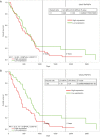Immunotherapy for mesothelioma: a critical review of current clinical trials and future perspectives
- PMID: 32206576
- PMCID: PMC7082257
- DOI: 10.21037/tlcr.2019.11.23
Immunotherapy for mesothelioma: a critical review of current clinical trials and future perspectives
Abstract
At the clinical level the role of immunotherapy in cancer is currently at a pivotal point. Therapies such as checkpoint inhibitors are being approved at many levels in cancers such as non-small cell lung cancer (NSCLC). Mesothelioma is a rare orphan disease associated with prior exposure to asbestos, with a dismal prognosis. Various clinical trials for checkpoint inhibitors have been conducted in this rare disease, and suggest that such therapies may play a role as a treatment option for a proportion of patients with this cancer. Most recently approved as a salvage therapy in mesothelioma was granted in Japan, regulatory approval for their use in the clinic elsewhere lags. In this article we review the current pertinent clinical trials of immunotherapies in malignant mesothelioma, discuss the current issues that may affect the clinical outcomes of such therapies and further evaluate potential candidate new avenues that may become future targets for immunotherapy in this cancer.
Keywords: Checkpoint inhibitors; biomarkers; co-stimulatory; dendritic cell; immunotherapy; mesothelioma; vaccine.
2020 Translational Lung Cancer Research. All rights reserved.
Conflict of interest statement
Conflicts of Interest: The authors have no conflicts of interest to declare.
Figures


References
Publication types
LinkOut - more resources
Full Text Sources
Other Literature Sources
